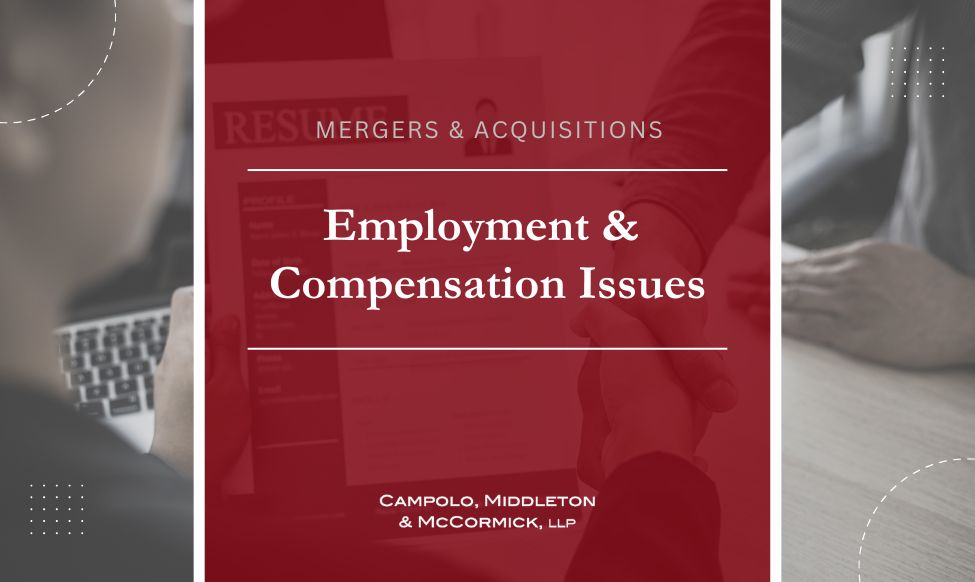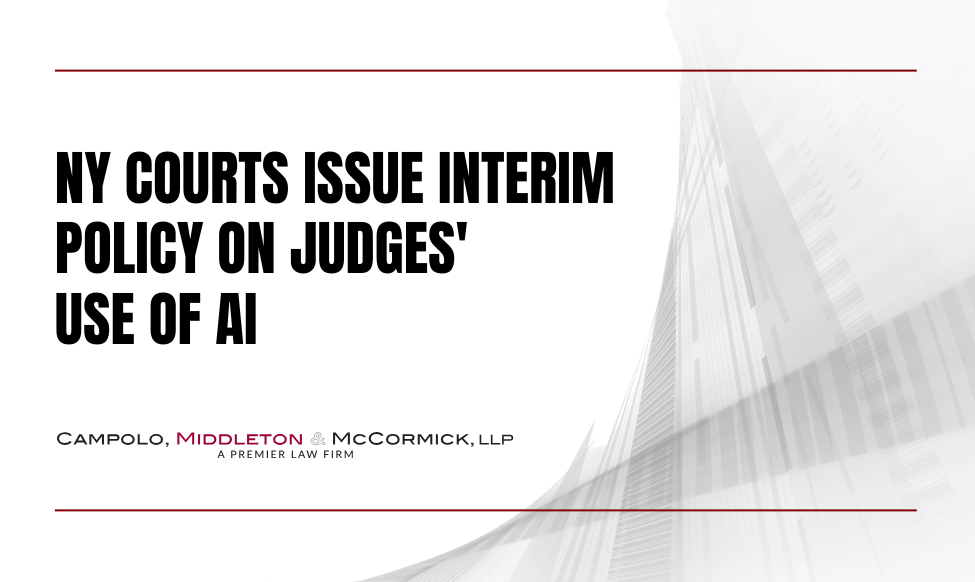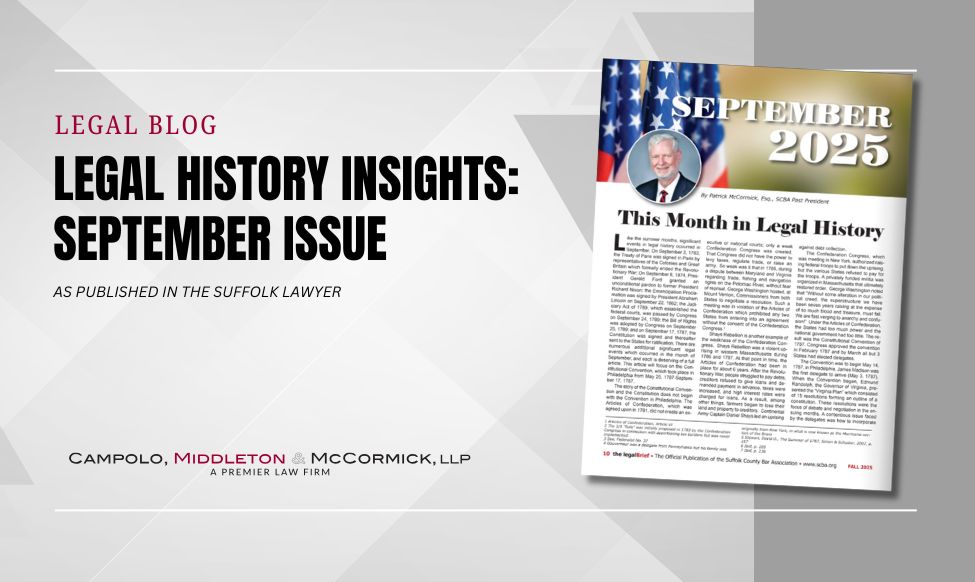Like the summer months, significant events in legal history occurred in September. On September 3, 1783, the Treaty of Paris was signed in Paris by representatives of the Colonies and Great Britain which formally ended the Revolutionary War; On September 8, 1974, President Gerald Ford granted an unconditional pardon to former President Richard Nixon; the Emancipation Proclamation was signed by President Abraham Lincoln on September 22, 1862; the Judiciary Act of 1789, which established the federal courts, was passed by Congress on September 24, 1789; the Bill of Rights was adopted by Congress on September 25, 1789; and on September 17, 1787, the Constitution was signed and thereafter sent to the States for ratification. There are numerous additional significant legal events which occurred in the month of September, and each is deserving of a full article. This article will focus on the Constitutional Convention, which took place in Philadelphia from May 25, 1787-September 17, 1787.
The story of the Constitutional Convention and the Constitution does not begin with the Convention in Philadelphia. The Articles of Confederation, which was agreed upon in 1781, did not create an executive or national courts; only a weak Confederation Congress was created. That Congress did not have the power to levy taxes, regulate trade, or raise an army. So weak was it that in 1785, during a dispute between Maryland and Virginia regarding trade, fishing and navigation rights on the Potomac River, without fear of reprisal, George Washington hosted, at Mount Vernon, Commissioners from both States to negotiate a resolution. Such a meeting was in violation of the Articles of Confederation which prohibited any two States from entering into an agreement without the consent of the Confederation Congress.[i] Shays Rebellion is another example of the weakness of the Confederation Congress. Shays Rebellion was a violent uprising in western Massachusetts during 1786 and 1787. At that point in time, the Articles of Confederation had been in place for about 6 years. After the Revolutionary War, people struggled to pay debts, creditors refused to give loans and demanded payment in advance, taxes were increased, and high interest rates were charged for loans. As a result, among other things, farmers began to lose their land and property to creditors. Continental Army Captain Daniel Shays led an uprising against dept collection. The Confederation Congress, which was meeting in New York, authorized raising federal troops to put down the uprising, but the various States refused to pay for the troops. A privately funded militia was organized in Massachusetts that ultimately restored order. George Washington noted that “Without some alteration in our political creed, the superstructure we have been seven years raising at the expense of so much blood and treasure, must fall. We are fast verging to anarchy and confusion!” Under the Articles of Confederation, the States had too much power and the national government had too little. The result was the Constitutional Convention of 1787. Congress approved the convention in February 1787 and by March all but 3 States had elected delegates.
The Convention was to begin May 14, 1787, in Philadelphia. James Madison was the first delegate to arrive (May 3, 1787). When the Convention began, Edmund Randolph, the Governor of Virginia, presented the “Virginia Plan” which consisted of 15 resolutions forming an outline of a constitution. These resolutions were the focus of debate and negotiation in the ensuing months. A contentious issue faced by the delegates was how to incorporate the States within a strong central government envisioned by the Virginia Plan, and the debate on that issue started with how to allocate representatives in Congress. The Virginia Plan proposed to eliminate the one state/one vote system existing under the Articles of Confederation and replace it with voting by each individual representative and that legislators would be apportioned by “the number of free inhabitants.” And thus, started what was likely the most contentious issue of the Convention and pitted small states against large states. Notably, small States outnumbered large States at the Convention and the Convention voted by State. The debate raged for about two months and, as did most issues faced during the Convention, ended with compromise. James Wilson of Pennsylvania made a deal with South Carolina to secure its support for representation in one branch of Congress based on population by what has been called the 3/5 compromise.[ii] This proposal initially passed by a vote of 9-2. How to determine representation in the Senate was next to be determined and Benjamin Franklin proposed the “Great Compromise” which called for proportional representation in the House and equal representation in the Senate.[iii]
It took the delegates until the end of July 1787, more than two months after the Convention opened, for them to turn to the Chief Executive/President. Questions that persisted were the length of the term, how to elect the President, could the President run for additional terms, could a “bad President be removed, and should he have veto power over legislation. Gouverneur Morris[iv] described the significance of the debate: “It is the most difficult of all rightly to balance the executive. Make him too weak: the legislature will usurp his powers. Make him too strong: he will usurp the legislature.”[v] Again, debate ensued followed by compromise. James Wilson proposed the elector system which helped the Southern States because while slaves could not vote, they would be counted when allocating electors. The elector system gave the people a role (electing the electors) appeased both the Southern States (3/5ths Compromise) and the large States (number of electors based on total number of representatives n the House and Senate). The delegates recognized flaws in the provisions related to the President and anticipated amendments to address the flaws. The 12th, 22nd and 25th Amendments each address some of those flaws.
Slavery came up again in connection with certain navigation acts and the authority of Congress. The Fugitive Slave Clause (Article IV, Section 2, Clause 3) was agreed upon to secure eliminating a 2/3 majority voting requirement for certain navigation/trade acts. Rufus King described the issue of slavery as one of the Constitution’s “greatest blemishes” and Madison stated that as “Great as the evil is, a dismemberment of the union would be worse.”[vi]
Gouverneur Morris, who drafted the Constitution’s preamble, described the Constitution as being based on compromise: “Each state [was] less rigid on points of inferior magnitude than might have been otherwise expected. And thus the Constitution which we now present is the result of a spirit of amity and of that mutual deference and concession which the peculiarity of our political situation rendered indispensable.”[vii]
On Saturday September 15, 1787 the final roll call vote occurred and the draft Constitution was approved 10-0 (Rhode Island, New York and North Carolina did not vote). The Constitution was signed Monday September 17, 1787 and then sent to the States for ratification.
[i] Articles of Confederation, Article VI
[ii] The 3/5 “Rule” was initially proposed in 1783 by the Confederation Congress in connection with apportioning tax burdens but was never implemented.
[iii] See, Federalist No. 37
[iv] Gouverneur was a delegate from Pennsylvania but his family was originally from New York, in what is now known as the Morrisania section of the Bronx
[v] Stewart, David O., The Summer of 1787, Simon & Schuster, 2007, p. 157
[vi] Ibid, p. 205
[vii] Ibid, p. 236








